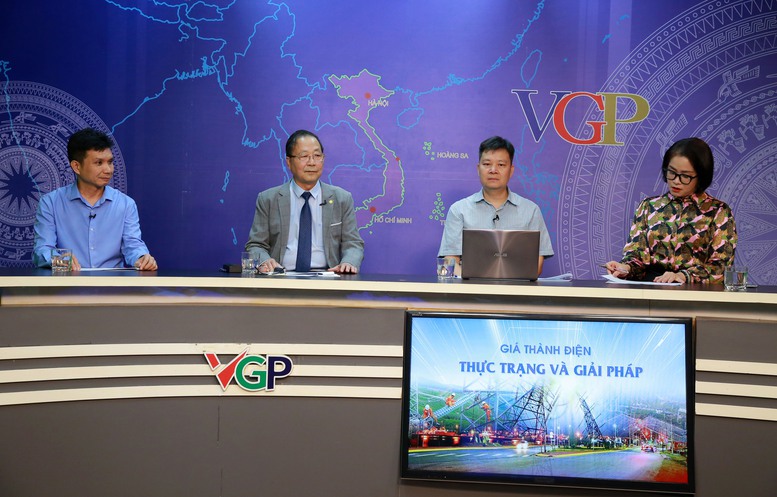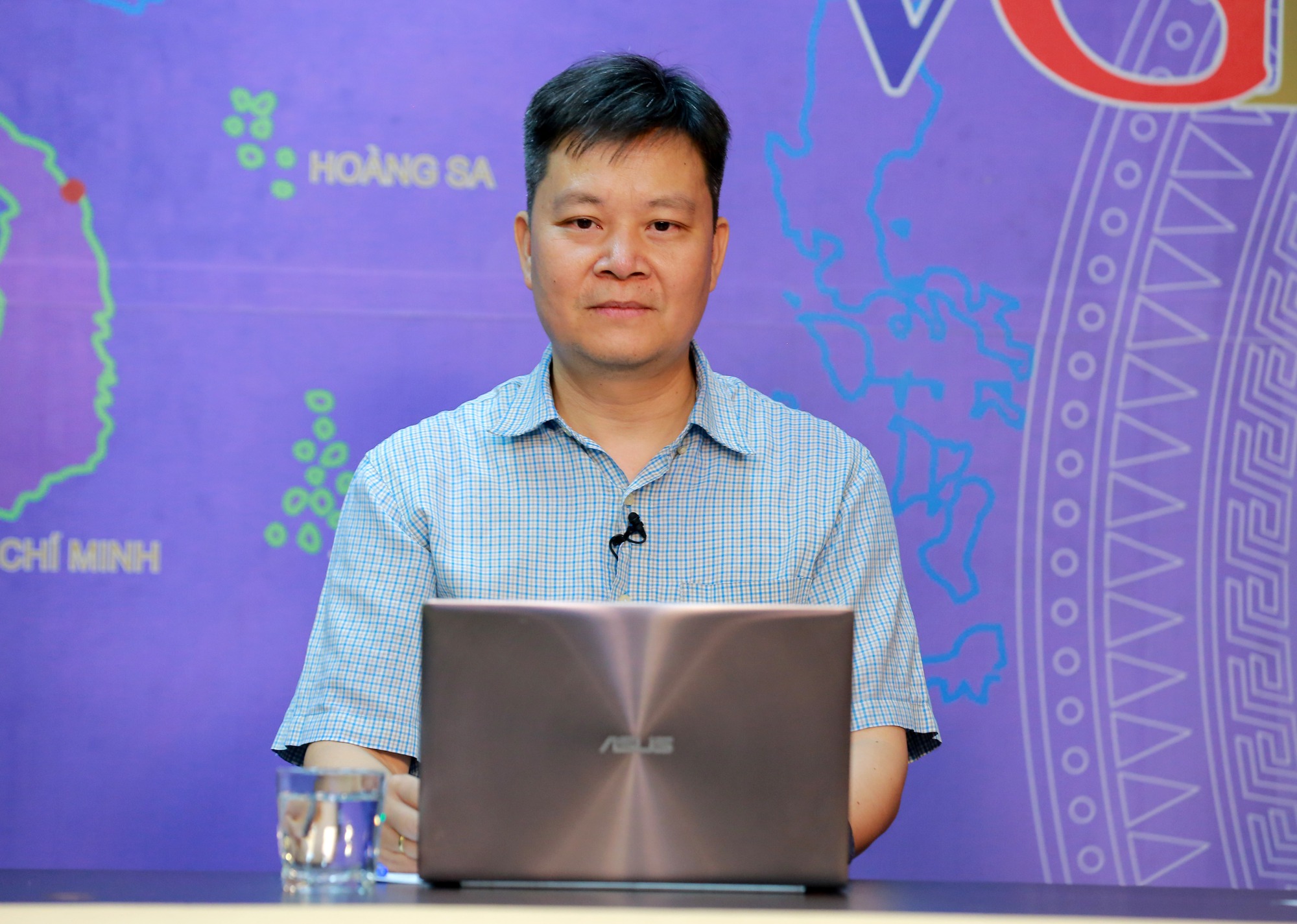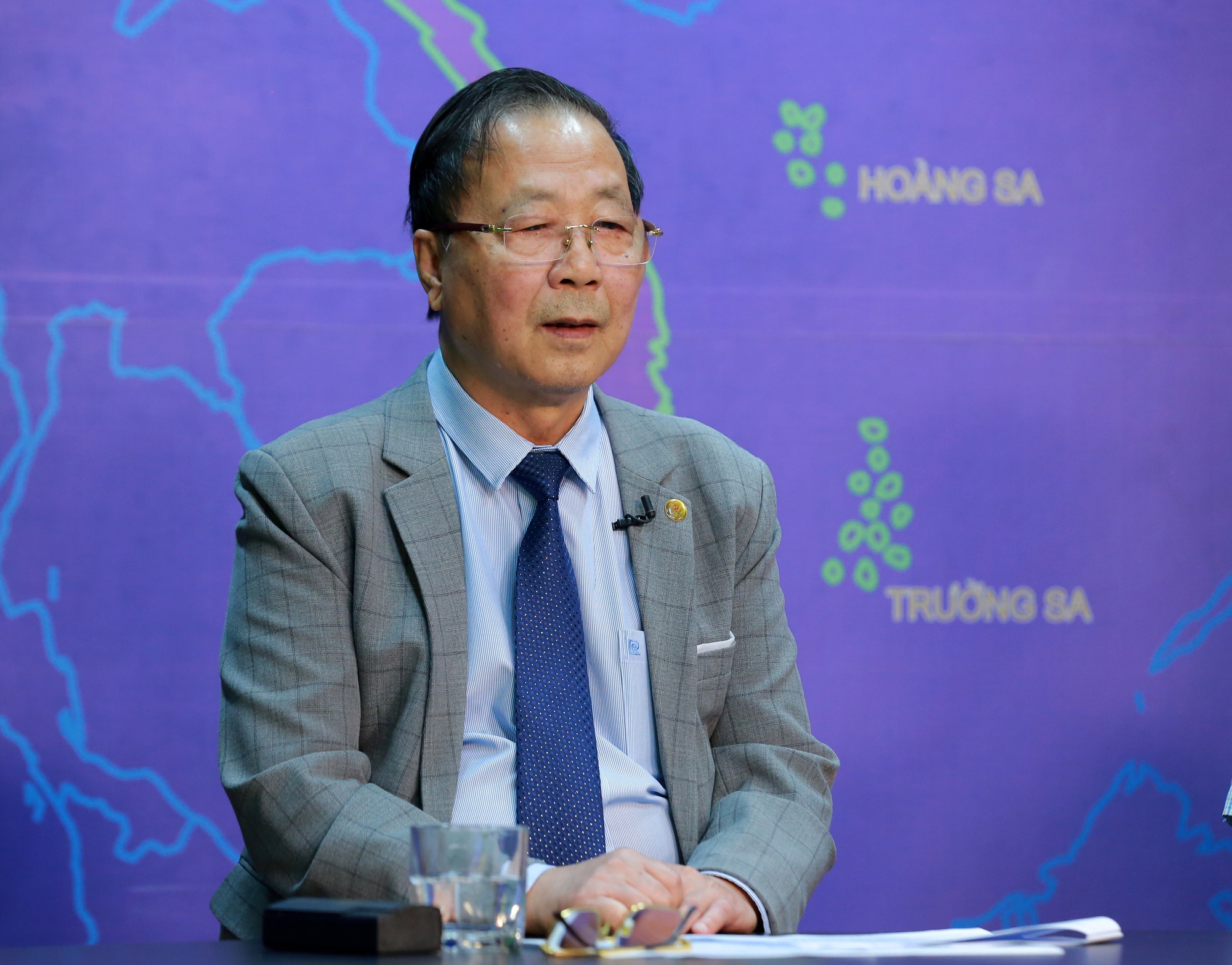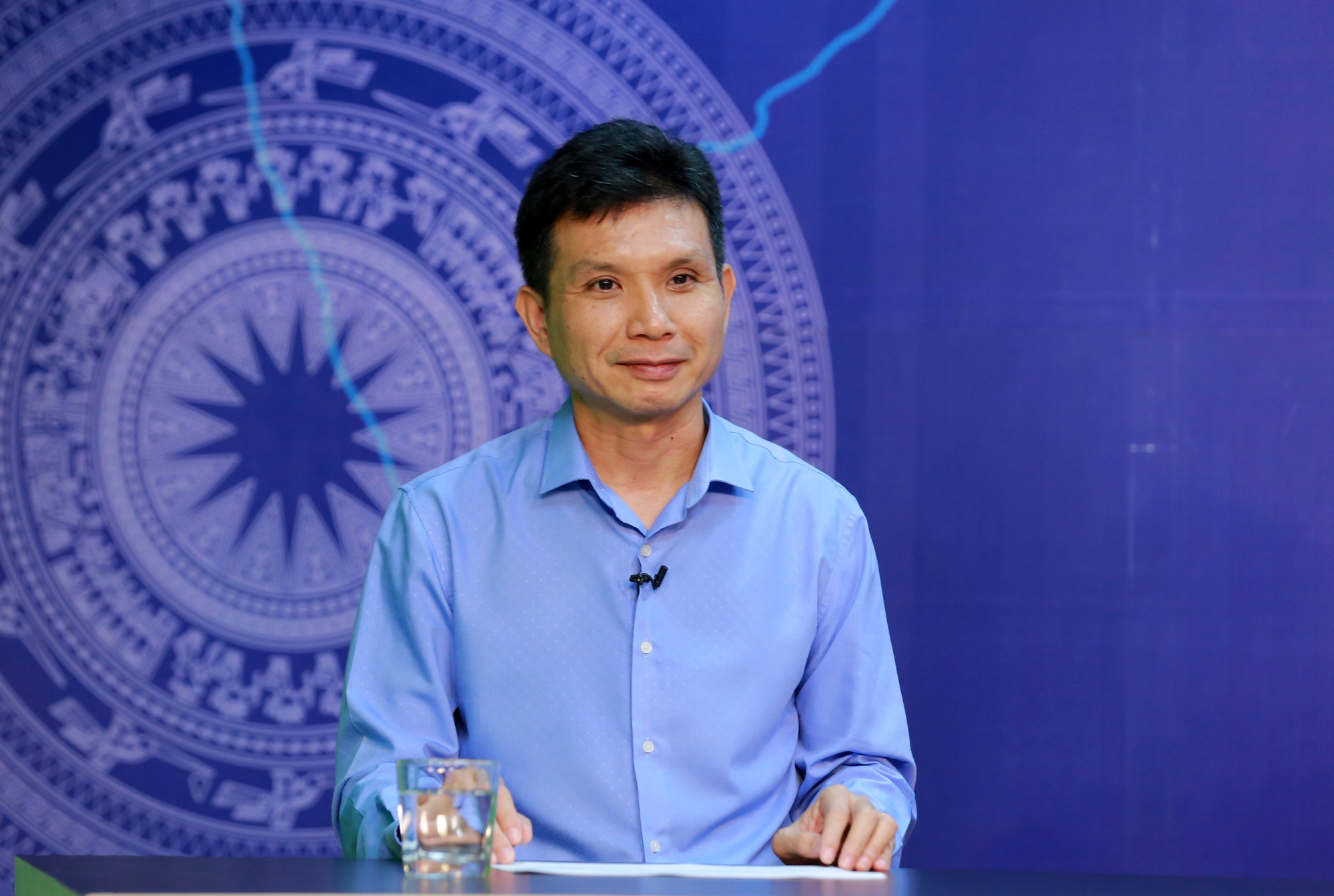
Experts and managers attending talk show "Electricity cost - Current situation and solutions" organized by Government Electronic Information Portal on October 10 - Photo:VGP
On the afternoon of October 10, the Government Electronic Information Portal organized a talk show "Electricity costs - Current situation and solutions" with the participation of managers, national assembly delegates, and economic and energy experts.
In the context of our country's many difficulties and to ensure harmony in economic goals associated with the implementation of social goals, in recent times, calculating the cost of electricity is incompleted, leading to distortive electricity selling prices which are not being fully calculated between input costs and output prices. In fact, the selling price of electricity is lower than the production cost.

Mr. Nguyen The Huu, Deputy Director of Electricity Regulatory Authority (Ministry of Industry and Trade) - Photo: VGP
Low price power sources decrease while high price power sources increase
From the perspective of state management, Mr. Nguyen The Huu, Deputy Director of the Electricity Regulatory Authority (Ministry of Industry and Trade) said the calculation of electricity prices is carried out according to Decision 05 dated March 26, 2024, of the Prime Minister. According to this regulation, the Ministry of Industry and Trade is responsible for presiding and coordinating with the Ministry of Finance and relevant units to check EVN's electricity production and business costs based on the electricity production and business cost reports and the financial statements audited by independent auditors.
Implementing this regulation, EVN's 2023 electricity production and business cost inspection mission was established including representatives of ministries and agencies including MOIT, MOF, MOLISA, CMSC and relevant associations such as the Consumer Protection Association, VCCI, etc. and interdisciplinary inspection teams including many experienced experts in the field of electricity have conducted field inspections at EVN and other member units, power corporations, the National Power Transmission Corporation, etc. to ensure objective and transparent inspection.
EVN's reports and the inspection process showed that, last year, input fuel prices for electricity production including coal, oil, gas prices, and foreign exchange rates all increased due to fluctuations in the world situation and the impact of El Nino phenomenon which caused the generation structure to fluctuate in an unfavorable direction. That means cheap sources of electricity such as hydropower decreased while expensive sources of electricity such as coal-fired and oil-fired increased.
"Along with that, Vietnam's electricity demand increased by approximately 10-11%. In addition to the cheap power sources that had been used up, we continued mobilizing higher-price sources. All these factors led to increased electricity generation costs," the Deputy Director of the Electricity Regulatory Authority pointed out.
In this context, according to the representative of the Electricity Regulatory Authority, EVN and its member units have implemented a number of solutions to save, reduce, and optimize costs, such as saving 10-15% of regular standard fees, reducing major repair costs by 20-50%.
EVN and its member units have also launched electricity-saving initiatives at all member units, however, the highly increasing price structure has led to an increase in EVN's electricity production costs.

National Assembly Delegate Phan Duc Hieu, Standing Member of National Assembly's Economic Committee attending talk show via online format - Photo: VGP
The biggest shortcomings in electricity prices
National Assembly Delegate Phan Duc Hieu, a Standing Member of the National Assembly's Economic Committee, raised the issue: Suppose electricity generators, distributors, and retailers have made every effort to reduce costs to achieve the most reasonable electricity price, but the electricity selling price is still lower than the production costs and distribution costs, this is clearly a shortcoming.
According to Mr. Phan Duc Hieu's analysis, inadequacies are clearly evident in a number of points. Specifically for electricity, we are not only talking about price and cost but also energy security and stability in electricity supply which is very important.
"If the electricity selling price is lower than the production cost and the producer sells at the production cost, the losses will accrue to the distributor. Thus, it is unfair to the distributor," Mr. Hieu frankly pointed out.
According to this National Assembly delegate, the distributor's efforts to reduce electricity purchase prices affect electricity producers and in the long term do not promote electricity production, affecting the security and stability of the electricity supply. In recent times, there have been times when the power supply was unstable, causing damage to the economy, people, and businesses.
"In the long term, this story needs to be resolved thoroughly," Mr. Phan Duc Hieu emphasized.
Sharing about these shortcomings, from the perspective of a price expert, Mr. Nguyen Tien Thoa, former Director of the Price Management Department, said: If the selling price cannot cover costs, it causes many consequences.
Citing specific data, Mr. Nguyen Tien Thoa said: Through published inter-industry inspection data, the electricity cost is 2,088 VND/kWh and the average selling price is 1,953 VND/kWh.
"That means the cost of electricity is 6.92% higher than the average electricity selling price. This is a situation of buying high and selling low. That means the input is market-based but the output is not determined to sufficiently cover the costs that have been calculated correctly, fully, reasonably and validly in the process of electricity production and business", expert Nguyen Tien Thoa analyzed.
This fact, according to Mr. Thoa, causes many consequences for electricity production and business, for electricity-using industries, and for the whole economy.
This expert also said that the inspection data is very objective and transparent. We must look straight at the truth to resolve these shortcomings.
Mr. Nguyen Tien Thoa stated: Resolution No. 55-NQ/TW of the Politburo requires the application of market prices for all types of energy, including electricity prices. Another issue is to remove all "barriers" to ensure transparent electricity prices according to market mechanisms.
The government has a regulation that based on how much the input changes in about 3 months, EVN is allowed to adjust the electricity price by the corresponding percentage.
To resolve inadequacies, according to Mr. Thoa, we must strictly observe the provisions of current law.
"The ultimate principle of electricity price management is to ensure compensation for reasonable and valid production costs that have been calculated correctly and fully," Mr. Nguyen Tien Thoa emphasized.
This price expert also said that if we can do this, there will be no loss for the electricity industry to subsidize the economy. Attracting investment to develop power plants and grids will be more favorable.

Mr. Nguyen Tien Thoa, Former Director of Price Management Department - Photo:VGP
Ensuring harmony of interests of electricity market participants
According to Mr. Nguyen Tien Thoa, the State should regulate electricity prices using market tools. These are taxes, fees, and funds to indirectly regulate factors that form electricity prices to have electricity prices that harmonize the interests of electricity market participants. The State should not directly intervene in prices.
In addition to ensuring accurate and sufficient calculation, and the State regulating through indirect measures and market tools, social security policies and the poor supporting policies should be separated from the electricity price policy and resolved with other policies such as direct support for poor households, thereby electricity prices will be more transparent.
"People who are subject to social policies are still cared for by the State and we do not abandon those subjects," Mr. Thoa pointed out.
Deputy Director of the Electricity Regulatory Authority (Ministry of Industry and Trade) Nguyen The Huu agreed with the opinion that in any situation, it is necessary to ensure harmony between the interests of the State, people, and businesses and ensure other social security issues, supporting the poor in accessing and using electricity.
"The social security policy in using electricity for poor households and social policy households has been applied consistently for many years, not just in the past few years," Mr. Nguyen The Huu affirmed.
The representative of the Electricity Regulatory Authority (Ministry of Industry and Trade) said that poor households and social policy households receive support equivalent to 30 kWh monthly from the state budget. The joint effort of the entire electricity industry as well as relevant agencies to ensure power security is also the most fundamental solution to ensure social security.

Dr. Ha Dang Son, Director of Center for Research on Energy and Green Growth - Photo: VGP
Electricity prices must be reformed
According to Mr. Nguyen Tien Thoa, the major guideline to do this must comply with the decision of the Politburo and Decision No. 05/2024/QD-TTg of the Prime Minister regulating the mechanism for adjusting average retail electricity prices.
Mr. Thoa analyzed that if we comply with these decisions, many problems will be solved because it gives us a market orientation, meaning that every time the input increases by this amount in 3 months, the prices will be adjusted correspondingly.
This expert also noted that electricity prices closely follow market fluctuations and are not completely floating according to market mechanisms. This is the market-based pricing mechanism that the State allows to adjust at a reasonable level.
"The throughout principle is to ensure production cost compensation in a correct, complete, reasonable and valid way for the electricity industry. Implementing these alone will solve many problems," Mr. Thoa emphasized.
In the long term, it is necessary to quickly amend the electricity price policy in the Electricity Law with a long-term vision to be able to handle requirements of one of the core issues of the electricity industry, which is electricity price.
Addressing this issue further, Dr. Ha Dang Son, Director of the Center for Research on Energy and Green Growth, said that we already have the legal basis and specific instructions from the State. The problem is that we haven't used the tools we already have at hand so we shouldn't think about new things. In the immediate future, what needs to be done first, such as amending the Electricity Law and introducing new mechanisms and policies, the Government has already done.
According to Dr. Ha Dang Son, we are seeing a roadmap to reform the entire electricity industry with the orientation of Net Zero goals and sustainable development of Vietnam.
"To do these things, we must first reform electricity prices. In that case, we will have institutions and basic foundations to convert and transmit energy in the direction of bringing more "clean, green" electricity sources in the structure of electricity generation", the Director of the Center for Research on Energy and Green Growth pointed out.
Translator: Vân Ly
Share